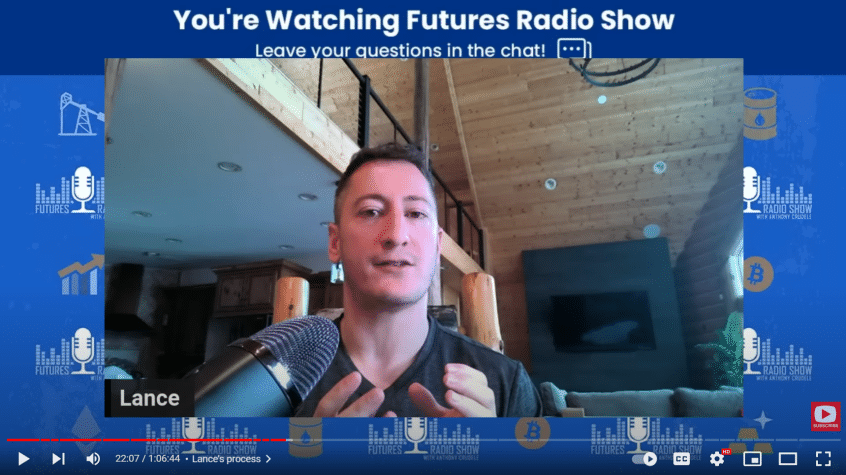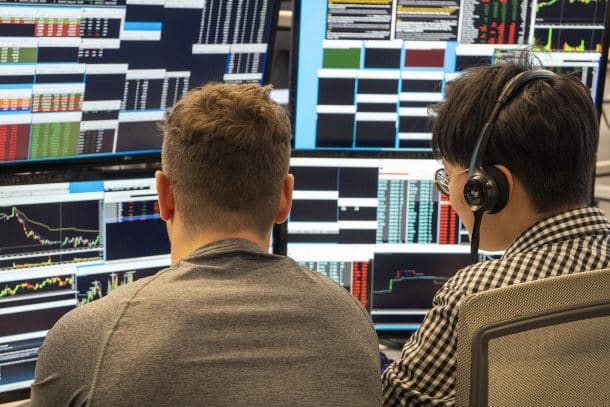
@TheOneLanceB joins @FuturesTrader71 and Anthony Crudele, Host of Futures Radio Show, for a deep discussion on a topic important to many new and developing traders and even experienced traders: What Contributes to Being a Consistent Trader?
Below are the Show Notes from this discussion, compiled by SMB for the trading community.
Here is what one viewer said about this video:
One of the best pieces of content I’ve come across in my 2.5 years as a trader. Excellent, excellent points made by all three of you. So many gems to take from experienced, professional traders. Well done. Thank you all!
You can watch the entire video here.
Show Notes
Key Takeaways
- Bella and Lance have known each other for over a decade.
- Lance read “One Good Trade” and loved it.
- Lance wanted to end his trading career and leave (his firm) on top, then start his non-profit work. From this, SMB just seemed the place to go.
- The success in trading comes from the process.
- If your process is solid, then your results will flow.
- Most people will focus on the wrong things like indicators, chart setups, costs, etc. This is the wrong idea.
- The topics that are to be focused on are things like setups, workout routine, getting your mind preparation in, etc.
- Some of the most exciting days of trading for Lance were the $500 type of days because of the concept that your process is starting to really work, build, and show results.
- A key difference between an individual trader versus a prop trader would be structure.
- The environment is a large factor of what makes a prop firm amazing.
- Being in a prop firm gives people access to tools and resources of profitable traders, a potential short-term income in order to focus on the long-term process, etc.
- Lance is a firm believer that this process is so hard that you really need about 2 years of building.
- There are many ways to trade the market. There isn’t a right way to trade the market, but there are wrong ways.
- You’re going to fall and you have to accept that this is going to take multiple tries to have things click.
- The first part of consistency is consuming a lot of information and then the next step would be cutting out the stuff that doesn’t work for individuals.
- People may not actually have a plan when entering the trade. Then you can’t define whether the trade actually has edge, deserves risk, what you’re looking for in a trade, etc. You need to have a plan and you need to find the start of the trade.
- Within the first year of trading, Lance was probably one of the last students in his class in terms of progress, even though he had one of the best traders as his mentor.
- You have to know what you’re trying to work on every single day and how you want to approach that as well.
- The process of consistency deals with the ideal of trading with intention.
- Focus on the high probability setups, what they do, their level of edge, and ignore everything else.
- Different setups will have different values of risk, depending on their probabilities and edge, along with how you perform on them.
- You’re going to have to sit through all the garbage types of trades in order to really find and execute on the high probability / fruitful trade.
- The equity curve is astonishing once you remove all the errors from trading.
- The errors in trading would account for the concept of inconsistency when it comes to trading.
- You really have to put in the time with this in order to really find consistency in trading.
- Lance focused on getting as much feedback as possible when it came to his trading.
- One of the key trading components that you get in a prop firm would be the accountability topic.
- Morad has been around some traders where they will call it a day if their first trade of the day is just garbage for numerous reasons. They have that level of discipline
- Prop trading like SMB Capital is a completely different type of atmosphere compared to other businesses like FTMO (a pay-to-play prop firm).
- Lance believes that having a collective group or pod to reflect with is a key component to the trading process.
- One thing Lance observed at SMB was that the younger guys were outperforming the older guys because of the fact that they were able to adapt to things. They didn’t necessarily know better and just did their thing, compared to being stubborn.
- Ultimately, things are very hard to tell and very nuanced when trying to figure out if it is your fault in trading results being negative or just the market environment being less than ideal.
- If you’re losing 35 out of 40 trades a week, then you’re not hitting high probability trades or setups.
- If you’re in a little bit of a rut or drawdown period, don’t be afraid to take a step back and reset /recollect.
- There are many ways to trade with intention or to have deliberate practice.
- The odds of success with no mentorship or feedback is basically slim to none in making it in this career.
- Lance loves the “Bobble-Head” process. Inch up in the process each and every day. Everything else will take care of itself.
- As long as your expected value is increasing every day, you will be able to make it in the long term, compared to just focusing on the P&L every single day.
- Scaling is easy when you have a positive expected value in the long-term.
- A negative expected value in the long-term is like walking in a tunnel. However, once you start to see a positive expected value in the long-term, you’re beginning to see the light / get out of the tunnel, and now it’s game time.
Quotes
- “The first thing we think of when we get into trading is, How much money can I make?”
- “What does it take to become a consistent trader?”
- “You have to water the seed.”
- “What do you find most consistent in the items you trade?”
- “You need to have a very systemized routine when you approach things.”
- “You need to give yourself a long enough runway.”
- “No one really gives themselves the gift of time.”
- “Investment in time.”
- “Process over outcome.”
- “You need to have a battle plan for what you’re trying to work on.”
- “Trading with intention”
- “In order to have good deliberate practice, you need to have good reporting and journaling.”
- “Do not fall for the trap.”
- “Put yourself in the best position to win.”
- “Feedback is one of the integral components when it comes to deliberate practice or trading with intention.”
- “You can’t always trust the P&L in the short-term time-frame.”
- “Does success truly come from being consistent or when to really push/ not to push?”
- “At the end of the day, if you’re red, it’s always going to be in some way your fault.”
- “I don’t want to be like most people, I need to make the changes. I need to do what the market is telling me to do and not be like most people”
- “Money is won and lost all the time.”
- “Don’t be afraid to take time off.”
- “I don’t know what I’m going to make or lose today, but I know that I’m going to do this right today.”
- “Keep trusting in the process.”
- “Putting in that extra work in the extended hours just adds money to the pocket in terms of the long-term expected value.”
Key 1-min Segments
- 9min mark where Anthony talks about the process part between the differences of a prop trader and individual trader
- 14min mark where Morad Askar begins to talk about what works for traders as independents based on what he has seen
- 18min mark where Lance talks about the early part of his trading career and then meta learning
- 21 min-22 min mark where Lance talks about the art analogy relating to setups, the process of studying them, etc
- 35min mark where Lance talks about feedback from the market
- 41min mark where Lance talks about performance of junior traders (less-experienced) compared to senior traders (more-experienced) during a trading month
- 44min mark where Lance talks about consistency in the terms of expected value in the long-term
- 46min mark where Morad Askar talks about his pillars when it comes to trading consistently
- 53min mark where Morad Askar talks about “PTTD” (Post Traumatic Trader Disorder”
- 55.5min mark where Lance touches on the deliberate practice / trading with intention (end)
From all of us at SMB, train and trade well!
Mike Bellafiore is the Co-Founder of SMB Capital, a proprietary trading desk, and SMB Training, which provides trading education in stocks, options, and futures. Bella, @MikeBellafiore, is the author of One Good Trade and The PlayBook. He welcomes your trading questions at [email protected].


